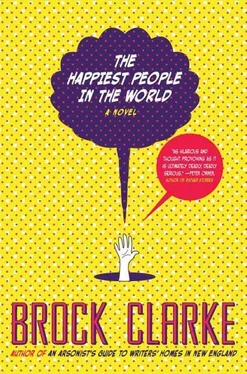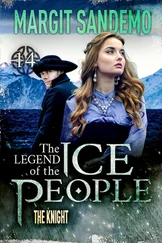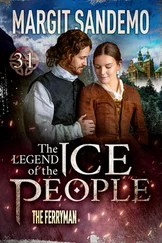“Who,” Kurt repeated. “From.” This was Matty’s own tactic, and the tactic of all educators and parents everywhere. Anytime one of his students or his son made a grammatical error, Matty repeated the error, out loud, just so the poor kid could hear how incredibly wrong it sounded. But you know, sometimes it didn’t sound all that bad. Better, at least, than the grammatically correct alternative. Matty could tell by the tone of Kurt’s voice as he said the word in Danish that he was starting to get impatient. But even so, Kurt was obviously having a hard time not smiling now; Matty knew Kurt was looking forward to hearing his dad say, From whom did you buy your pot?
“Who do you buy your pot from?” Matty repeated.
“ Dr. Vernon,” Kurt said.
“No.” This genuinely shocked Matty. He’d always considered Vernon a friend, or at least not an enemy. At the very least he didn’t think the guy dealt drugs to students. Matty should have been furious with him. But all he could think was, Poor guy. Although it did explain some things. Although mostly he still couldn’t believe it. “ Dr. Vernon sold you pot?”
“Sometimes,” Kurt said. “But mostly I just smoked his.”
“Well, that is a relief,” Matty said, and Kurt looked at him. The look was strange. With it, Kurt seemed to be trying to say, I don’t want to hurt you anymore. It was basically the opposite of every look Kurt had ever given Matty since Matty could remember. It made Matty want to take back all the things he’d ever said that had caused Kurt to look at him that way in the first place.
“Don’t worry, I’m done with that,” Kurt said. Then Kurt started muttering that word again. Muttering it and muttering it until they were almost at the end of the block. Matty could see the cemetery wall turn left. Straight, across the intersection, were more tables, more blue jeans, more dark-skinned men in dashikis. But right before the intersection, there was a man standing alone behind one of the tables. On the table were two enormous towers of blue jeans. Kurt leaned over and said that word, and the man smiled, scratched his beard, and in English told Kurt, “Your friend needs new dungarees.”
Dungarees! Matty thought but did not say. “No, thank you,” Matty said.
“Dad,” Kurt said. And then to the man, he said, “How much?”
“I don’t need new jeans,” Matty said.
“I think you do,” Kurt said.
“Two thousand kroner,” the man said.
“ Two thousand kroner ?” Matty repeated. He tried to do the math in his head. “How much is that?”
“How much is two thousand kroner?” the man asked. He seemed honestly baffled by the question. He scrunched his face in Kurt’s direction, and Kurt scrunched his in Matty’s.
“Dad, please,” he said.
“But isn’t that way too much for a pair of jeans?” Matty said. Denmark was expensive, but he knew it wasn’t that expensive. Plus, there was nothing special about these jeans. They seemed to be Wranglers, but not really: There was something wrong with the stitching on the back pockets. The W’ s were all wobbly, as though they’d been sewn by a passenger on a small boat sailing in a big sea.
Kurt leaned away from the man, toward his father, and whispered, “I don’t think we’re really paying for the jeans.” And then Matty finally got it. He reached into his front pocket — he could not be made to say “fanny pack,” let alone wear one — pulled out his wallet, and handed the man the cash. The man took it and counted it. He then folded the jeans carefully and slid them across the table. Kurt held the jeans to his chest, and he and Matty went back the way they’d come, past all the tables, back on the train, back to the airport, to the rental car counter, where Matty got the car, because Kurt was too young to get the car. Kurt did drive it, though, out of Copenhagen and onto the highway, as though he’d been doing this all his life. At one point, just outside the city, after the traffic had thinned, Matty turned and noticed that the dungarees they’d bought were flung across the backseat. Clearly there was no gun in them. Kurt must have put the gun in his jacket pocket. And only then did Matty ask his son, “What was the word you kept saying in Nørrebro?” Even Matty heard himself mangling the pronunciation. He was like a lot of Americans: he pronounced foreign words with a dramatic French accent, even though he didn’t speak French, either.
“Nørrebro,” Kurt said, getting it right, Matty assumed. “Capo.”
“What?”
“Capo,” Kurt said. “That’s the word I was saying.”
“Capo,” Matty repeated. The word didn’t sound Danish. Matty was pretty sure it was Italian — he’d probably heard it in a gangster movie — and that it meant “boss,” or something. “Isn’t that Italian for ‘boss’?”
“No,” Kurt said. “It’s a made-up word. It doesn’t mean anything.” Matty recognized Kurt’s tone. It’s the tone you take with your kid when you want him to stop asking you annoying questions and go to sleep already. Matty did that. When he woke up, they were going over a bridge. The bridge was enormous. So were the fjords. The cliffs. The yawning open water. How was it possible, Matty had wondered, for such a small country to be made up of such big things?
And then they reached the other side, and the landscape had changed, dramatically, away from the dramatic.
“Is that wheat?” Matty asked. He pointed out the passenger’s side window at the fields, where something stumpy and brown was growing, or dying, in neat rows that stretched from the road to the sea. Kurt told him that they were just over an hour from Skagen. The rain was falling, dark was falling, the temperature was falling: the dashboard said it was 2 °C, whatever that meant. They were driving a white BMW sedan; it had been the cheapest rental car available at the Hertz in the Copenhagen Airport. Which is not to say it was cheap. I am in Denmark, Matty thought. I am in Denmark with my son, who is driving a luxury automobile. Then Matty pointed out the window again. “I wonder if that’s wheat,” he said, and when he did, he could hear Ellen laughing. Matty liked to think that he was the most cosmopolitan man in Broomeville. And other than his brother, that might have actually been true. But one second in any place outside upstate New York, and Matty had always started to act like the rube he’d always tried very hard not to be. On his and Ellen’s honeymoon in New York City, for instance, Matty hadn’t been able to get over how expensive everything was. When they went out to dinner, he took one look at the menu and said, unbelievably loudly, as though he were addressing not just Ellen but the entire restaurant, “Jeez, I hope the water’s free!” Ellen had laughed at him then, and he wondered whether she would have laughed at him now, too.
“Do you think that’s wheat?” he asked, and then he started laughing.
“What’s so funny?”
“I was just thinking about your mom,” Matty said, and then Kurt’s face went stony. This had been happening lately. Kurt would not talk about his mother. He would not talk about her at all. The subject made Kurt mute. For instance, a week after the shooting, when Matty was still in the hospital, Kurt had come to visit him and caught his father crying.
“Hey,” Kurt had said. He’d leaned over Matty’s hospital bed and hugged him.
“I was just thinking about your mom,” Matty had said into Kurt’s shoulder, and immediately Kurt had stopped hugging him. He’d plopped down into the chair next to the bed and started watching the soap opera on the television set, not looking at his father, not saying a word. He wasn’t saying a word now, either. They passed a sign that read SKAGEN 90 km. Matty had run a 10K once, and so he knew that ninety kilometers was fifty-five miles, more or less. He could imagine his son not speaking for the rest of the trip, and maybe not ever, if Matty kept talking about Ellen. “I’ll shut up,” Matty said.
Читать дальше












